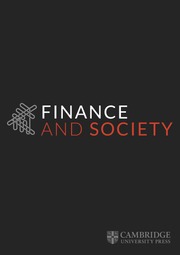Article contents
Money is time: On the possibility of critique after neoliberalism
Published online by Cambridge University Press: 09 November 2023
Extract
What is the relationship now, and what should the relationship be, between a social-theory oriented critique of neoliberalism, such as the one Konings provides, and other disciplines? In this review essay, I suggest some of the conversations we might form between Konings' text and texts of a more Marxist variety, including Alfred Sohn-Rethel's Intellectual and Manual Labor, as well as contemporary literary studies texts, including Mary Poovey's Genres of the Credit Economy and Fredric Jameson's “Culture and Finance Capital”. In each potential pairing, I suggest a possible relationship between historical time, financial time, and narrative itself.
- Type
- Forum: Capital and time
- Information
- Creative Commons
- This is an Open Access article, distributed under the terms of the Creative Commons Attribution-NonCommercial-No Derivatives licence (http://creativecommons.org/licenses/by-nc-nd/4.0/), which permits noncommercial re-use, distribution, and reproduction in any medium, provided the original work is unaltered and is properly cited. The written permission of Cambridge University Press must be obtained for commercial re-use or in order to create a derivative work.
- Copyright
- © 2018 The Author(s)
References
- 5
- Cited by


